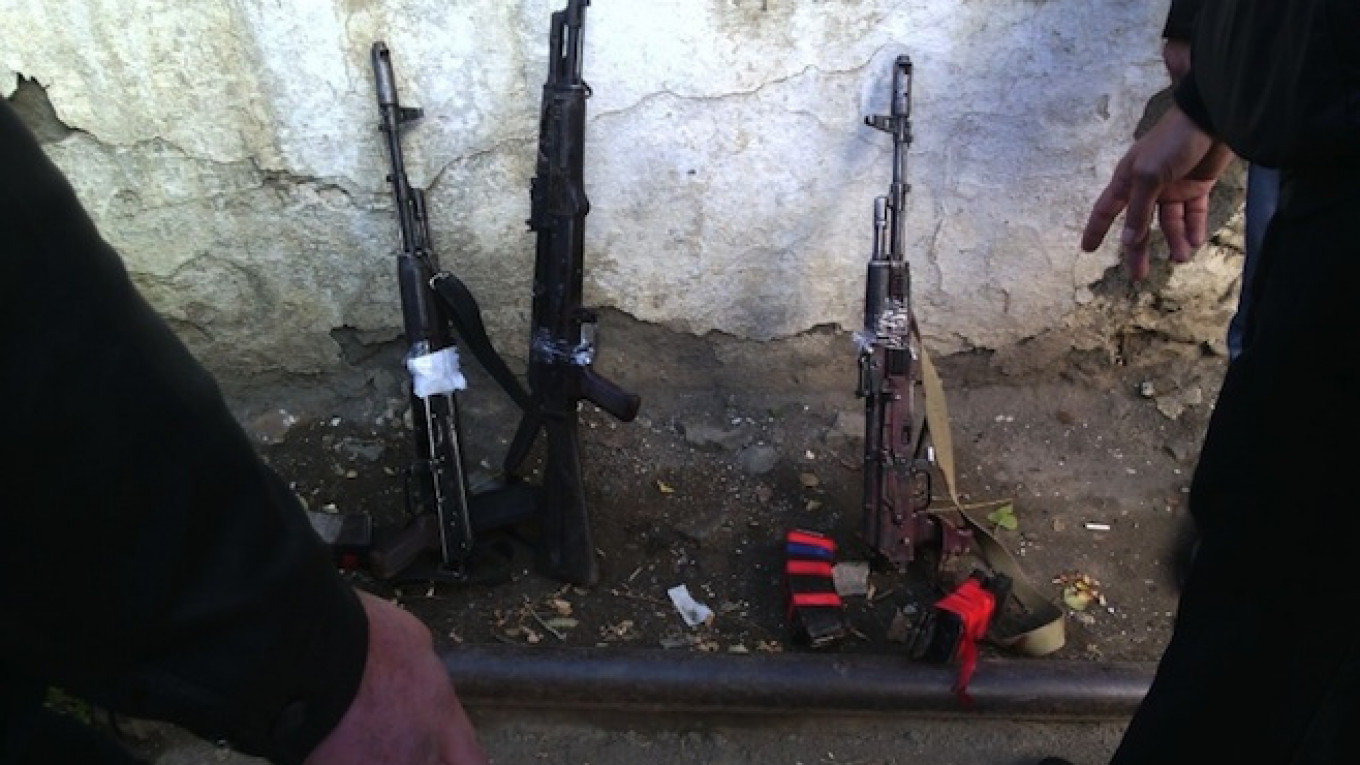The leaders of the Caucasus Emirate's Dagestan network have pledged their loyalty to the Islamic State — at once defying the organization's leader, putting to bed rumors of the group's waning relevance and perhaps spelling disaster for Russia's security services, which have sought to stop the spread of radical Islam in the turbulent republic.
The Dagestan network is the most active branch within the Caucasus Emirate, an organization that seeks to establish an independent Islamic emirate in Russia's predominantly Muslim republics and expel Russian authorities from the region.
In a video released late Friday, head of the Dagestan branch Abu Muhammad and one of the branch's top commanders in Makhachkala, Abu Muhammad Agachaulsky, took an oath to Islamic State leader Abu Bakr al-Baghdadi and called on all insurgents in the republic to follow suit.
The pair's pivot toward the Islamic State flies in the face of the leader of the Caucasus Emirate, Aliaskhab Kebekov, who has been openly critical of Islamic State tactics and famously called for an end to all violence against civilians. In a sign that not all of Dagestan's insurgents support Kebekov's more moderate line, Agachaulsky and Muhammad follow in the footsteps of Khasavyurt insurgent commander Suleiman Zailanabidov, who took a vow of allegiance to al-Baghdadi in late November.
The news hints at a major rift within the ranks of Caucasus Emirate fighters, as several leaders have spoken out against the especially brutal tactics used by Islamic State fighters and expressed disapproval of their actions.
Kebekov made waves this summer by calling on militants to refrain from hurting civilians in attacks, announcing an abolition to the "black widow" practice that saw the wives of dead militants carry out suicide bombings. Such bombings have been devastating for ordinary Russians on more than one occasion, including in both the Moscow metro bombings of 2010 and last year's Volgograd attacks.
Whether or not the shift toward the Islamic State means that more such attacks are on the horizon depends on how many fighters return from Syria, and how well-equipped they are to bypass security measures, said Georgy Engelhardt, an independent expert on Islam.
As for Dagestan's Islamic insurgents who have voiced loyalty to Islamic State, Engelhardt said, there will be "some activation on their part, though not exclusively against civilians."
"Major terror attacks against Muslim civilians are unlikely, but attacks against non-Muslims are a different issue," he said.
Varvara Pakhomenko, an independent expert on the North Caucasus for the International Crisis Group, agreed that the Dagestani leaders' vows to al-Baghdadi could result in "more brutal actions" from fighters in the North Caucasus, with a "possible renewal of terrorist actions against the civilian population."
"Kebekov, while he doesn't forbid men in the Caucasus from going to fight in Syria, speaks very negatively about Islamic State leader al-Baghdadi and advises those in the North Caucasus who have sworn allegiance to the Islamic State to go to Syria," Pakhomenko said.
"Kebekov has more moderate policies, trying to win over support from the local population, which has become especially relevant for the underground insurgency recently, when there is such a mass exodus of fighters to Syria," she said.
The recent attack in Chechnya was Kebekov's policies in action, she said, with victims limited almost exclusively to members of law enforcement.
Now, with Dagestan's top insurgent leaders throwing those more moderate policies out the window, the landscape of militant activity in the republic is expected to drastically change.
"There's a strong likelihood that financial support for the Islamic State will grow on the part of Dagestan's insurgency," Pakhomenko said, a development which would likely see a spike in the extortion schemes that militants there are known for.
Add that to the potential homecoming of militants who've gone to Syria and returned with "significant battle experience, connections and more radical views on Islamist ideology," she said, and the security services will have their work cut out for them.
Contact the author at [email protected]
A Message from The Moscow Times:
Dear readers,
We are facing unprecedented challenges. Russia's Prosecutor General's Office has designated The Moscow Times as an "undesirable" organization, criminalizing our work and putting our staff at risk of prosecution. This follows our earlier unjust labeling as a "foreign agent."
These actions are direct attempts to silence independent journalism in Russia. The authorities claim our work "discredits the decisions of the Russian leadership." We see things differently: we strive to provide accurate, unbiased reporting on Russia.
We, the journalists of The Moscow Times, refuse to be silenced. But to continue our work, we need your help.
Your support, no matter how small, makes a world of difference. If you can, please support us monthly starting from just $2. It's quick to set up, and every contribution makes a significant impact.
By supporting The Moscow Times, you're defending open, independent journalism in the face of repression. Thank you for standing with us.
Remind me later.






